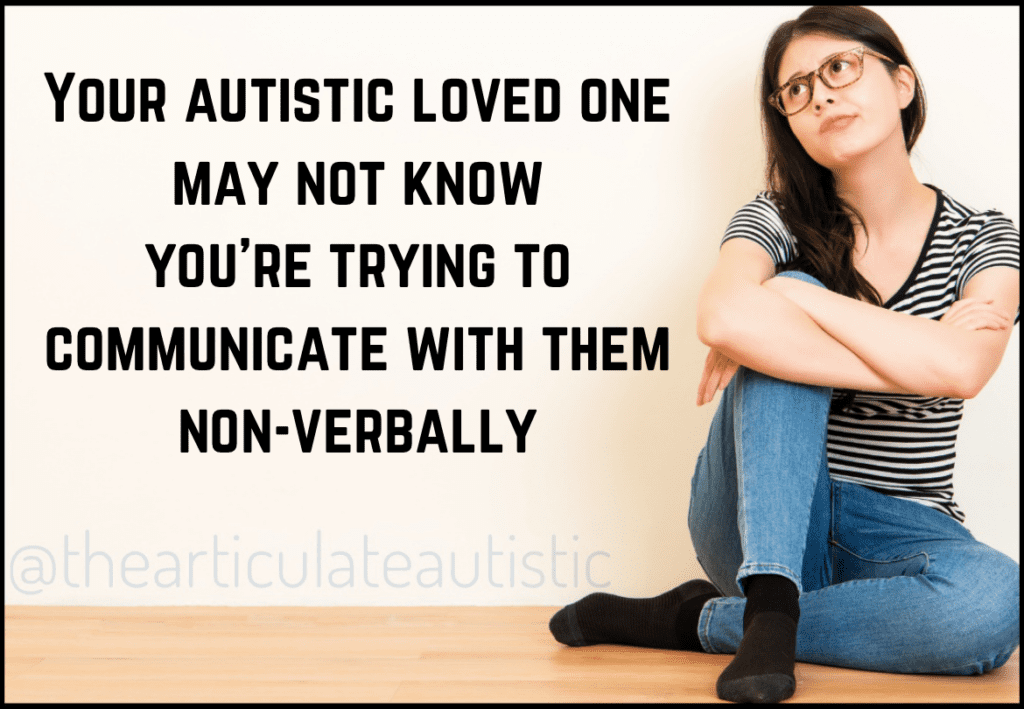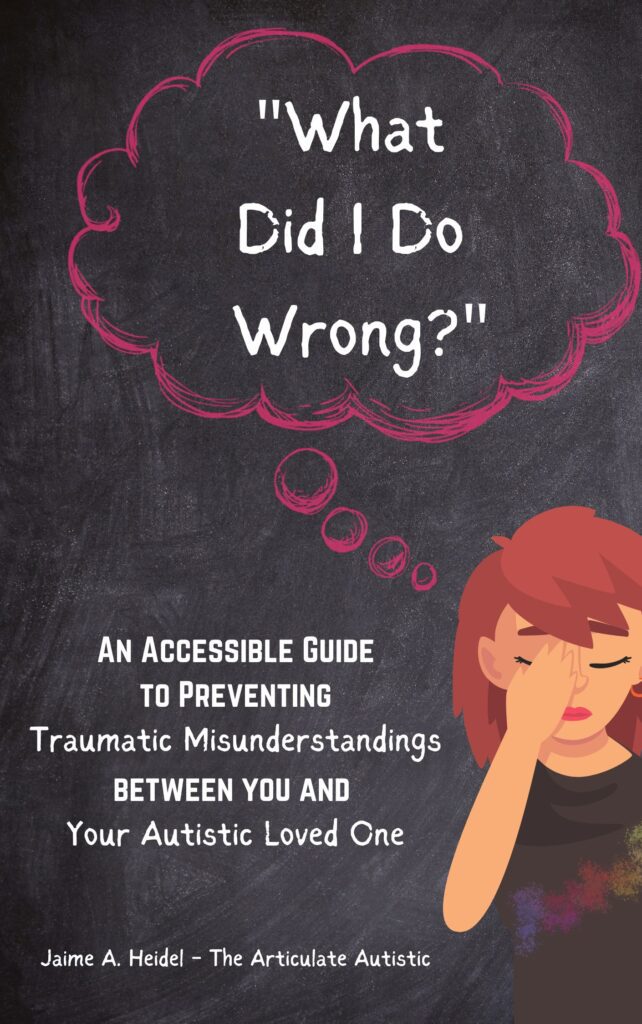Your Autistic Loved One May Not Know You’re Trying to Communicate With Them Non-Verbally

I regularly ask discussion questions on my Instagram, and the answers I received to the one I posted on Monday had me scrambling to get an article about it out as soon as possible, because, in my opinion, this information needs to be available to every neurotypical person who interacts with autistic people in any capacity whatsoever.
What’s the information? It turns out, quite a few autistic people in their 20s, 30s, 40s, 50s, and beyond are still wholly unaware that non-verbal communication exists!
This means that when I asked the question, “Autistic Folks: When did you first realize that people communicated non-verbally?” some of my readers learned in that very moment! And for some, obtaining this knowledge in that manner was a devastating gut punch because suddenly, they learned that yet another communication skill that (I believe) should be taught directly (instead of assuming everybody automatically knows) remained inaccessible to them until I happened to bring it up!
As I mentioned in the original post, I learned about non-verbal communication when I was still in the single digits, but I still vaguely remember my response to it–and I didn’t believe it was real. I don’t know how the conversation went at the time, but I remember saying something like, “Of course, I can’t “read” faces! Faces aren’t books!” and, eventually, “Stop it! That’s not real! Nobody can do that!”
For me, before I learned non-verbal communication existed, it really did sound like some kind of magic. It didn’t sound real or believable to me–and I really did think people were just making it up. What do you mean people “talk” with their bodies?? It was eventually something I had to study from books when I got older–and that’s when I finally learned the phrase, “80% of communication is non-verbal.” (Cue rapid eye blinking due to shock.)
I actually forgot what that shock felt like, but I was humbly reminded when I made that Instagram post.
The Autistic Person in Your Life Is Not Selfish or Ignoring You
I have had countless, countless misunderstandings happen when having social interactions with neurotypical people, be those interactions with family, friends, teachers, co-workers, etc.
Those misunderstandings often occurred because, as an autistic person, I take what is said to me literally, I often miss jokes and sarcasm, and I have a flat, monotone voice and facial expression (unless I’m consciously animating them by masking).
I also miss social cues, not just the social cues hidden in nuanced language, but facial expressions and body language–in other words, those non-verbal cues, as well, which can make neurotypical people think I’m flat-out ignoring their needs or unspoken requests, or that I’m just too selfish to notice.
This was never the case. I was completely unaware of the existence of non-verbal communication! I may have been exposed to the concept as a child, but I still wasn’t 100% convinced it was real at the time, and it took running into the same social problems as an adult amongst total strangers for me to finally start researching, reading about it, and taking it seriously.
So, when I see some autistic adults now who still are unaware that people use their faces and bodies to communicate without words, it tears at my heart. Because they, just like me when I was younger, are walking through life without the vital information they need to survive and avoid so many social and professional pitfalls!
This lack of awareness of non-verbal communication isn’t any more about ignoring others or being selfish than it would be for a colorblind person to not realize certain colors exist. A person can’t have a frame of reference for something they’ve never experienced before.
Communicate Directly With Words to Your Autistic Loved One
It’s possible that the autistic person in your life, right now, no matter their age or experience, is wholly unaware that non-verbal communication exists. Think about that for a second. You may have believed this whole time that this person didn’t care, and that they have been ignoring your “obvious” signs when they didn’t respond, but for that person, those signs do not exist.
The very next time you need to convey something to the autistic person in your life, convey it with clear, concise language that doesn’t rely on facial expressions or body language at all.
Furthermore, don’t use hints or double-speak. Say what you mean and mean what you say.
I’ll give you an example:
Ineffective: You walk into the kitchen where your autistic loved one is slicing an apple. You sniff the air loudly and make a disgusted noise in the back of your throat because the garbage smells bad. You take some old food out of the fridge and dump it, holding the lid of the trash can open so the smell really gets out to make your point. “Oof! That’s bad!” You say this as you scrape the gunky leftovers into the stinking trash. The next morning, you smell a strong odor as you walk into the kitchen. The trash is still there! You can’t believe it! After all, you “told” your autistic loved one to take it out. How dare they!?
Effective: You walk into the kitchen where your autistic loved one is slicing an apple. You don’t interrupt them because they’re concentrating really hard on this task, and if they get startled by your sudden appearance in the kitchen, they may slip and cut their finger–especially if they are also dyspraxic like me. You take note of the unpleasant trash smell and send them a text message that reads, “I noticed the garbage smells and needs to be taken out. Can you take it out after you’ve finished with your apple?”
The Takeaway
Don’t attempt to communicate with your autistic loved one non-verbally unless you are 100% sure they will know and understand your intended meaning. As in, they have told you so directly.
If there is any doubt, be direct with your words before getting angry, jumping to conclusions, and having an emotional reaction toward your autistic loved one based on those conclusions–because for them, it will feel like an attack that came out of nowhere, and they will experience trauma and be less likely to trust you.
Meanwhile, you will still not get your needs met, and this unhealthy (and totally unnecessary) cycle might continue for a lifetime.
Reduce traumatic misunderstandings between you and your autistic loved one. My book, “What Did I Do Wrong?” will be available for pre-order on September 8th, 2023. Click here to join the book mailing list for the latest updates and links to purchase!




I only recently discovered your blog and I am not exaggerating when I say it has already changed by life. I have lived with my autistic husband for 31 years and although I have tried really really hard to understand our differences this is the first time I have been given such pragmatic, useful guidance. Thank you so much!
I wish I knew someone that willing to learn. At least you’re trying, Andrea.
Good luck to both of you.